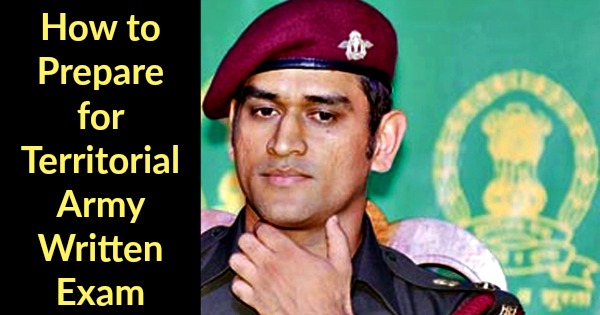Applicants of Territorial Army are working job professionals, it means for most of the TA appearing candidates’ preparation for TA is not in their main curriculum since they are already occupied by the busy job working schedule. In this article we are sharing few tips for TA written exam preparation.
Territorial Army 2016 Online Coaching
Territorial Army Exam Pattern:
Syllabus for Exam, No of Questions & Marks
| S.No | Paper | Subject | Nos. of Questions | Marks |
|---|---|---|---|---|
| (i) | I | Reasoning and Elementary Mathematics | 50+50 | 100 |
| (iI) | II | General Knowledge and English | 50+50 | 100 |
- Time: Maximum time for each paper is 02 hrs and will be conducted in two sessions from 10:00 hrs to 12:00 hrs and 14:00 hrs to 16:00 hrs.
- Type of Exam: Objective (OMR Answer Sheet will be used).
- Qualifying Marks: The candidates will have to score minimum 40% marks in each paper separately and have an overall average of 50% to qualify.
- Penalty for Wrong Answers: There will be penalty imposed for wrong answers marked by a candidate as under:-
- There will be four possible answers to every question. For each question for which a wrong answer has been given by the candidate, half of the mark assigned to that question will be deducted as penalty.
- If a candidate gives more than one answer, it will be treated as a wrong answer even if one of the given answers happens to be correct. Penalty will be imposed as above.
- There will be no penalty for questions not attempted.
How to Prepare for Territorial Army Written Exam
- Delaying will delay your rank: TA is not an exam where you can study up overnight and give the exam the next day, to score fairly good marks. The syllabus for TA is handy enough, and that is why you need time to prepare for the same. So do not procrastinate and delay to start your preparations, if there is any time right to start the preparations it’s now.
- Score via English: English questions are pretty much easy and straight, so they give a good chance of scoring in TA. There are books which will definitely help you in improving and preparing for English, one of them is Pearson’s.
- Current affairs bag direct marks: Yes, in the general awareness paper, very few questions are there which are direct, otherwise others will be based on either assertion, reasoning or paragraphs will be given from which questions will be asked. The direct questions are majorly from the current affairs portion.
- Clear your base: Some other questions which are direct are basics knowledge based. So if your basics are good then you can surely answer these, and fetch marks. Direct questions are always a better way to go, because either you know the answer or you don’t. If you can answer them, you score marks and save time.
- Solved papers are a boon for history: The portion for history is the most typical to prepare. The being its vast and lengthy scope. While for people who like history it’s easy to remember and read, for those of us who can’t read a book and want nutshells, it can be difficult. This is where solved papers come to rescue. Of course, history can’t change, so if you read up three-four years of solved paper, you can cover up a great deal.
Tips to Prepare for Essay Writing
- Pick a topic
Pick a good topic out of the given choices. Once you have determined the purpose, you will need to do some research on topics that you find intriguing. Whatever the mission of the essay, make sure that you are interested in your topic.
- Prepare an outline or diagram of your ideas
In order to write a successful essay, you must organize your thoughts. By taking what’s already in your head and putting it to paper, you are able to see connections and links between ideas more clearly.
To create a diagram, write your topic in the middle of your page. Draw three to five lines branching off from this topic and write down your main ideas at the ends of these lines. Draw more lines off these main ideas and include any thoughts you may have on these ideas.
- Write your thesis statement
Your thesis statement tells the reader the point of your essay. Your thesis statement will have two parts. The first part states the topic, and the second part states the point of the essay.
- Write the introduction
Now that you have developed your thesis and the overall body of your essay, you must write an introduction. The introduction should attract the reader’s attention and show the focus of your essay.
Begin with an attention grabber. You can use shocking information, dialogue, a story, a quote, or a simple summary of your topic. Whichever angle you choose, make sure that it ties in with your thesis statement, which will be included as the last sentence of your introduction.
- Write the conclusion
Conclusion brings closure of the topic and sums up your overall ideas while providing a final perspective on your topic. Your conclusion should consist of three to five strong sentences. Simply review your main points and provide reinforcement of your thesis.








